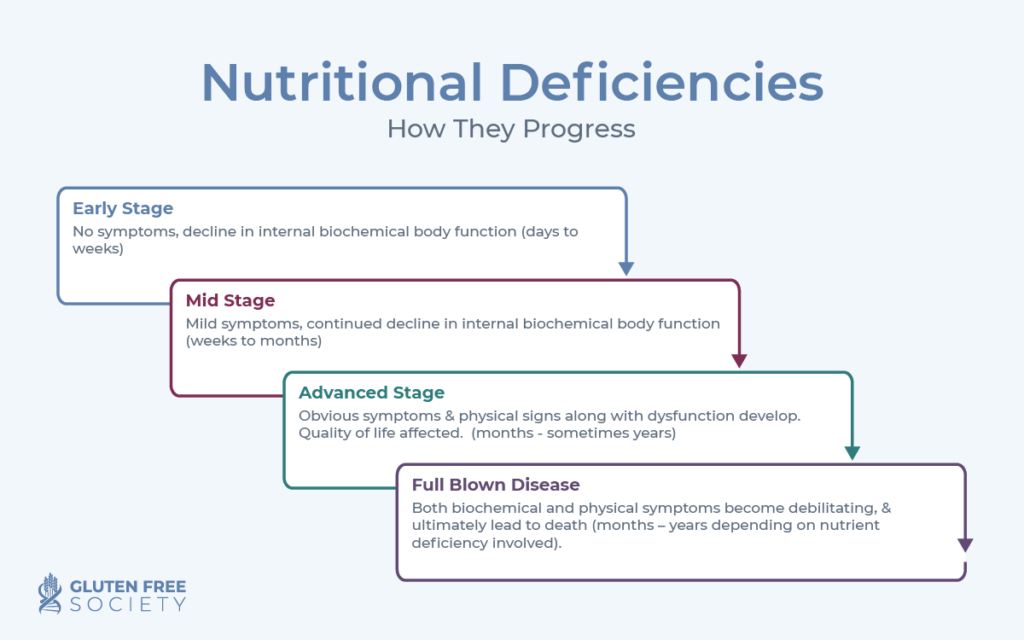Supplement guide
Nutrition plays a major role in a person’s development, the processing of information in the body, and the progression towards disease. Being properly nourished is crucial to overall quality of life and longevity.
Therefore, improper or insufficient nutrition, or a nutrient deficiency, can disrupt the body’s ability to heal and repair itself but also can cause disease. For example, a vitamin B1 deficiency can cause Beriberi, a vitamin B3 deficiency can cause Pellagra, and a vitamin C deficiency can cause scurvy.
Unfortunately, those with celiac disease or gluten sensitivity are especially prone to nutritional deficiencies. This guide will discuss why that is the case, along with the following:
- Types of nutrient deficiencies
- Symptoms of nutrient deficiencies
- Why nutrient deficiencies develop
- Why supplements are recommended for those with celiac disease and gluten sensitivity
- What supplements are recommended for those with celiac disease and gluten sensitivity
Nutrient deficiencies
We can go so far as to say that all of the known factors involving human health and wellness and disease are affected predominantly by nutrition. Similarly, nutrient deficiencies can negatively impact all aspects of health. Unfortunately, deficiencies are not understood well by many doctors and practitioners due to lack of training. Making nutritional investigation as a contributing factor to disease a rarity.
Types of nutrient deficiencies
Nutrient deficiencies for those with celiac disease or gluten sensitivity can be caused both directly by gluten ingestion and indirectly through the damage done by gluten. In addition, many following a traditional gluten free diet choose highly processed gluten free food substitutes lacking appropriate nutrient density. This increased consumption of empty calories contributes to a lack of vitamins and minerals in the diet.
Gluten induced nutritional deficiencies
Gluten causes inflammatory damage to the gut that causes the gut to be unable to properly absorb nutrients, which leads to more nutritional deficiencies. Gluten can also cause inflammatory damage in other areas of the body. This increased inflammation can lead to the depletion of vitamins and minerals required by the body to heal and repair the gluten induced damage.
Furthermore, many who embark on a gluten free diet replace wheat, barley, and rye with highly processed corn, oat, and rice products. These ultra processed foods have been shown to be inadequate in nutrient density, and their consumption has been linked to poor nutritional outcomes in celiac patients.
Drug induced nutritional deficiencies
The issue of drug induced nutritional deficiencies is well documented with numerous texts and research studies being written on the topic. Celiac disease and gluten sensitivity result in a number of nonspecific symptoms. These symptoms are often treated with medicines rather than being addressed by fixing the root cause (diet change). Many of the medicines used to treat gluten and nutrient deficiency related symptoms hurt more than help, as they mask important symptoms that could lead to a proper diagnosis. Many of these medications can also interfere with the function of the GI tract, thus causing vitamins and mineral deficiencies.
Symptoms of Nutritional Deficiencies
There are different symptoms associated with nutritional deficiencies depending on how significantly the deficiency has progressed. Symptoms also vary based on the type of deficiency that you are experiencing. Here is a brief summary of what to expect by stage of deficiency. Keep in mind that symptoms will vary by person, and any questionable symptoms should be thoroughly explored by a practitioner through nutrient testing.

- Early Stage Deficiency
In the early stages of deficiency, there are often no obvious symptoms manifesting yet. However, that doesn’t mean that there are no impacts on your health “behind the scenes.” Even in the early stages of nutrient deficiency, there is a decline in the internal biochemical body function. Some people may notice slight changes in their health in the early stages of deficiency. For example, if the nutrients needed for thyroid health are deficient, the thyroid cannot produce and convert hormones as needed, and this may lead to fatigue. Unfortunately, many people dismiss these mild symptoms and attribute them to other lifestyle factors, like being busy or stressed at work. - Mid Stage Deficiency
When a deficiency progresses beyond the early stages, more obvious, but still mild symptoms start to develop. This is the result of a continued decline in the internal biochemical functions. This decline may also start to present as abnormal results on lab testing for certain bodily functions. This stage can last from weeks to months. - Advanced Stage Deficiency
In the advanced stages of deficiency, obvious symptoms and physical signs of deficiency start to develop. For example, a deficiency in vitamin B12 can cause shortness of breath, fatigue, and muscle weakness. - Full Blown Disease State
The most severe form of nutrient deficiency is when the deficiency has led to disease. In this state, a person will experience both physical and biochemical symptoms that can become debilitating.
Why nutrient deficiencies develop
- Lack of nutrient intake
The bottom line is that if you aren’t eating a variety of healthy, nutrient-dense foods, your body isn’t getting what it needs. With so many processed and packaged foods available that are devoid of nutrients, it has become increasingly difficult to make proper food choices. In addition, our soil has become increasingly depleted due to modern farming practices. This means that we could eat the same food today as our grandparents did a few decades ago and we get fewer nutrients. - Increased need for nutrients
Certain phases of life demand a higher nutrient intake. If you don’t meet that need, you can easily become depleted. Some examples include the following:- Growth spurts: Baby, children, and adolescents are growing quickly and they require more nutrients to accommodate their growth spurts. For example, adolescents are more likely to develop zinc deficiency as their body is growing because the body requires more zinc during this time.
- Pregnancy: Pregnancy is among the most nutritionally demanding phases of life, as the nutrients a pregnant woman consumes must cover the needs of herself as well as her growing baby.
- Breastfeeding: Like pregnancy, breastfeeding involves a woman feeding and nourishing both herself and her baby.
- Increased or intense exercise: Exercise has wonderful benefits for the body but is also a muscular trauma that requires nutrients for healing and repair, and regrowth of the tissue. This results in a higher demand for nutrients in order to heal and repair the damage induced by the exercise.
- Trauma: Similar to exercise, trauma in the form of a sprain, tissue damage, a broken bone, injury, or other traumatic event requires additional nutrients for healing and repair.
- Chronic inflammatory disease: Chronic diseases like diabetes, autoimmune disease, and celiac disease cause increased inflammation in the body, which results in heightened nutrient needs to help manage the inflammation.
- Increased loss of nutrients
Certain conditions and situations cause the body to lose nutrients at a faster rate, making a deficiency more likely. Such conditions include the following:- Kidney disease: malnutrition in those with chronic kidney disease results from a combination of a number of issues, including decreased appetite and nutrient intake, hormonal derangements, metabolic imbalances, inflammation, increased catabolism, and dialysis related abnormalities.
- Burns: nutrients can be lost through a burn
Aggressive skin inflammation: psoriasis or eczema lose proteins and nutrients more aggressively) - Medications: many medications directly inhibit vitamin or mineral absorption. Birth control and proton pump inhibitors are common examples.
- Diuretics: caffeine is a common diuretic that causes a greater degree of water-soluble nutrient loss in the body
- Alcohol: alcohol can cause B vitamin loss
- Malabsorption & maldigestion
A number of conditions that affect different parts of the digestive tract can lead to malabsorption and maldigestion, including the following:- Celiac disease: The inflammatory damage caused in the villi causes malabsorption and maldigestion
- Ulcerative colitis: The inflammation experienced by ulcerative colitis makes it hard to break down food and to extract nutrients from what you eat and drink.
- Crohn’s disease: Some common medications used for Crohn’s disease, such as antacids, can damage gut motility l
- Gastritis: Inflammation of the stomach which is a common cause of protein and mineral malnourishment
- Pancreatitis: When the pancreas becomes damaged, pancreatic enzymes are not produced, and malabsorption results.
- Medications that alter GI motility, digestive processes, or microbiome function
- Poor dentition: Compromised dental function or not having complete teeth can result in the lack of ability to properly chew food, which can affect digestion and absorption
- Altered metabolic function
When metabolic function is compromised, the body is unable to properly digest and absorb nutrients. Metabolic function can be altered through lifestyle choices and substances like drugs, alcohol, medications, and toxic burdens. It can also be affected by genetic (single nucleotide polymorphisms (SNPs) or by genetic inborn errors of metabolism that are out of one’s control. - Surgical procedures
Certain surgical procedures performed on various components of the digestive system can influence nutrient absorption. For example, gastric bypass affects the stomach, cholecystectomy (removal of the gallbladder) impacts bile secretion and fat absorption, and intestinal resection results in less area for nutrients to be absorbed.
Why Gluten Sensitivity supplement? Shouldn’t we just eat real food?
Of course you should eat healthy whole foods. But oftentimes, food just isn’t enough. In fact, research shows that removing gluten from the diet does not always correct the problem, and that many with long term gluten induced damage need more nutrients for healing and repair. Here are some of the reasons that you may need to supplement:
- You may need to make up for long term nutrient deficiencies that cannot be addressed through the nutrient levels in food alone.
- Even the best efforts to eat well can be challenging due to depleted soils and declining nutrient levels.
- You may still be repairing your gut or dealing with other conditions that cause nutrient malabsorption.
- You may be taking medications that compromise nutrient absorption.

Best Supplements for Celiac Disease
There are a few key supplements that most people with celiac disease or gluten sensitivity could benefit from.
However, before we get into it, it is important to know that not all supplements are created equal. Many supplements use poor nutrient forms that are not well absorbed. In addition, many supplements (yes, even many premium or practitioner grade supplements) are cross contaminated with gluten. Therefore, it is critical to find a reputable company that specializes in providing gluten free supplements and that is committed to testing its ingredients and final products for gluten.
Avoiding gluten can sometimes be challenging because companies often put indiscriminate terms on the label that are not always obvious. You can view the GFS master list of hidden gluten right here.
In addition, the following list contains common fillers found in supplements that Gluten Free Society recommends you avoid:
- Wheat
- Barley
- Rye
- Malt
- Brewer’s yeast
- Hydrolyzed wheat protein
- Hydrolyzed vegetable protein
- Natural and artificial flavors and colors
- Wheat germ
- Grasses derived from Wheat, barley, rye, and oat
- Maltodextrin (wheat or corn based)
- Maltose
- Modified food starch
- MSG
- Rice flour or powder
- Hydroxypropylated Starch
- Hydrogenated Starch Hydrolysate
- Pregelatinized starch
4 supplements everyone with gluten sensitivity should take
- High quality multivitamin/mineral
A high quality multivitamin supplement will help to ensure that your body is getting a sufficient baseline of vitamins and minerals. Note that you may need additional support for certain nutrients, but additional supplementation for deficiencies should be confirmed by nutrient testing. Ultra Nutrients is formulated using a synergistic combination of vitamins, minerals, and active cofactors that enhance absorption and uptake by cells. Each of the key nutrients packed into this powerful and compact super multi is provided in the optimal amounts, using only those forms found in nature and proven through research to be safe and effective. - Omega-3
Omega-3 fatty acids are not usually not inclusive in multivitamins, and for good reason. Omega-3 fatty acids can easily become rancid if not packaged and stored properly. However, they are still critical to health in managing inflammation, and many people do obtain them in their diet (through cold water fatty fish), which results in a deficiency. The recommended intake is 2 grams per day of concentrated omega-3 which should contain both EPA and DHA. Omega Max contains an optimal balance of fatty acids to support disease prevention. Each capsule contains 420 mg of EPA and 300 mg of DHA. - Probiotics
Probiotics support overall gut health and healing, but it is important to take a probiotic with strains that have been shown to support those with celiac disease. For example, research has shown that probiotic intervention with Bifidobacterium breve strains has shown a positive effect on decreasing the production of the pro-inflammatory cytokine TNF-a in children with celiac disease who are following a gluten free diet. In addition, be sure to take a probiotic with a meaningful colony-forming unit (CFU) count. It is also worth knowing that probiotics start to deteriorate over time which impacts the CFU count, so purchasing from a reputable supplier is important. Biotic Defense includes 10 strains of bacteria, totaling 50 billion CFU’s per capsule. The strains in this probiotic were selected to support those with celiac disease and gluten sensitivity, and encourage healthy and timely elimination by acting as a natural stool softener, further encouraging a more complete digestion. - Digestive enzyme
A gluten free digestive enzyme provides support to help break down the food that you eat, making it easier to absorb its nutrients. Certain enzymes also have the ability to help break down gluten, which provides support if you accidentally ingest a product with gluten or food that is cross contaminated with gluten. Ultra Digest includes highly active enzymes with a broad range of specificities to handle all food preferences and is designed to help promote the availability and absorption of nutrients, health and vitality of cells, and improved overall digestive and immune system health. By addressing all three macronutrients to include carbs, fats, and protein. Ultra Digest’s unique formula helps to ensure complete digestive support, needed to help you get the most out of the food that you are eating while minimizing digestive discomfort. Unlike many other enzyme products, Ultra Digest has been studied to maintain its integrity and functionality by surviving the highly acidic environment of the stomach.
Test, don’t guess
Beyond some essential support supplements, patients with celiac disease and non celiac gluten sensitivity should get proper nutritional testing performed to identify nutritional deficiencies.
Why? One of the biggest delays in healing that patients with gluten sensitivity face has to do with the deficiency of vitamins, minerals, and other dietary nutrients. Many doctors check their patients for iron deficiency, but fail to check other essential nutrients like vitamin C, calcium, magnesium, selenium, zinc, chromium, B-vitamins, etc. Failure to address nutritional deficiencies can lead to delayed healing and delayed response to a gluten free diet.
Ask your doctor to perform comprehensive intracellular testing to help determine your need for supplementation. If they won’t check you, you can use Gluten Free Society’s INA test to get an accurate assessment of your nutritional status without a doctor’s order.
Conclusion
Nutrient deficiencies can disrupt the body’s ability to heal and repair itself and also can cause disease. Those with celiac disease or gluten sensitivity are especially prone to nutrient deficiencies. Unfortunately, the symptoms of deficiency can be hard to identify and isolate until they are severe, and even then, deficiencies are rarely investigated by healthcare practitioners.
Research shows that removing gluten from the diet does not always correct deficiencies, and many people with long term gluten induced damage need more nutrients for healing and repair. Therefore, it is important to find high quality supplements from a trustworthy source in order to help correct nutrient deficiencies and restore your body to optimal health.


7 Responses
Very good info.
Awesome.
This piece is such good info and thinking. I’m so happy I found Dr.Osborne–his book, his seminars, his FB Q and A. At age 85, I’m having a ball in life now. In just 2 weeks, my searing nerve pain in feet and legs has left the building after eating clean (non gluten way). (you can use this for a testimonial if you like)
Thx for your sharing. Do you have numbness in feet and above ankle? Thx.
Hello, I’m interested in ordering the Nutrient Deficiency Test. I see the test includes testing for copper levels. Can you please tell what methods of testing are used for this copper test? I’m mainly focus on getting the Ceruloplamin, RBC copper level, and Lympocyte Prolifiration. Can you please tell me if these 3 tests are included in the Nutrient Deficiency Test?
I live in the state of South Carolina. Is it ok to order test from here?
Thank you.
~Alicia
Hi Alicia,
The test measures using Lymphocyte Proliferation. It does not measure ceruloplasmin or RBC levlels.
Started to read this article because is said “Best Supplements for Celiac, nothing really mentioned here? Question not really answered. What a waste of my time expect more from the Gluten Free Society.
It is ALL here. You need to click on the highlighted words in the article to go to ALL the links for every nutrient that you may be deficient in. Test, don’t guess.